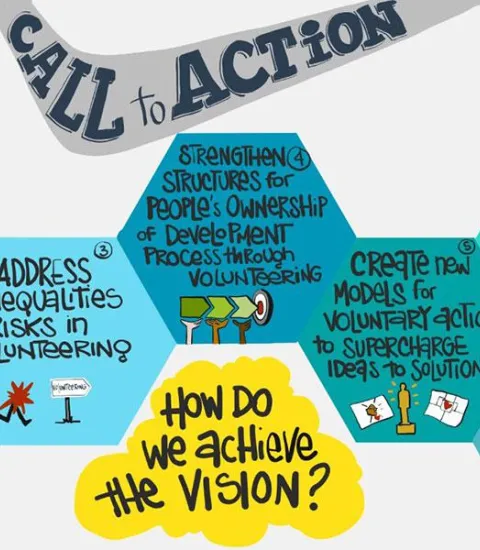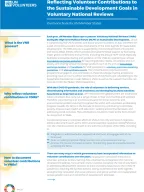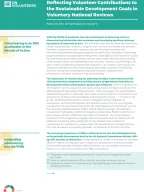
Top 13 insights from UNV's online consultations
In 2020, the United Nations Volunteers (UNV) programme held two parallel online consultations asking for your big ideas on catalyzing volunteering for the Sustainable Development Goals (SDGs) and on better integrating volunteering into wider policies.
About 50 participants joined in and left 230 comments. Below is a summary highlighting key discussion points:
1) Volunteers everywhere are making enormous contributions to the SDGs
Across the two discussions, there was widespread agreement that volunteers everywhere are making enormous contributions to the SDGs. In the discussion on integration, participants made it clear that volunteers are vital engines for sustainable development whether they are working alone or as part of wider, joined-up efforts. Many participants talked of a trend towards increased recognition of the distinctive contributions of volunteers to the SDGs and growing support to facilitate these contributions – such as in Thailand and Nepal. In both discussions, some participants still noted a lack of awareness of the positive benefits and contributions of volunteering by some groups (e.g. youth) and by many governments.
2) Volunteering organizations are increasingly well-coordinated and networked
It was emphasized across the discussions that volunteers and volunteer groups are often not acting alone. The role of coordinating bodies and platforms were highlighted by many participants as being important for building momentum for volunteers to be better integrated. While some participants noted the need for more coordination between VIOs to push forward the volunteering agenda, there were lots of interesting examples shared of alliances and partnerships effectively pushing for greater recognition and coordination across SDGs and stakeholder groups – such as in Sierra Leone and the Russian Federation. This was not the case for all participants, and some highlighted that support and coordination in fragile and crisis contexts is greatly lacking. In these contexts, volunteers play important roles but aren’t supported or coordinated – compounding the risks that these volunteers already face.
3) Volunteering is increasingly integrated but the potential is far from realized
In the integration discussion, participants shared examples of volunteering and volunteerism being included in policies and planning – such as in Malaysia, Pakistan and Zimbabwe - and particularly those related to disaster risk reduction and youth. However, across both discussions participants’ comments generally pointed to an unrealized potential of integration where they live. It still seems to be the case that volunteers and volunteerism are not yet fully embedded into the widescreen, full-HD picture of development, adding the unique value of volunteering to wider efforts to achieve the SDGs, alongside other types of actors and interventions. Participants noted the importance of identifying the hurdles that block integration in order to overcome them. These included a lack of data and evidence in particular, but participants also discussed the need to find ways to break through silos and connect agendas to better integrate volunteering across the work of governments.
4) Data and evidence gaps are a major challenge that hold integration back
Across the comments many participants noted data and evidence gaps as major challenges that hold integration back. Participants noted how evidence is important to make the case for volunteering and ensure that integration is aligned with SDG challenges, and that we need to be able to present good evidence that clearly demonstrates the ‘where’, ‘how’ and ‘why’ of integration into any policy or plan. If solid evidence on the added value and unique contributions of volunteering for the SDGs is not presented to policy-makers, volunteering will continue to be viewed as a nice extra.
5) There remains a disconnect between the policy environment and real-world application
Many of the participants also noted a disconnect between the policy and legislative environment and actual real-world application. Legislation and policies put in place to promote volunteering and support volunteers are not always applied effectively or fairly, and there is a need to look beyond the simple presence of volunteering ‘infrastructure’ to looking at impact. Participants asked the questions; are the policies and laws that are put in place to supposedly support volunteers actually having a positive effect? And are they supporting all volunteers or just some? Furthermore, participants noted the institutional challenges caused by shifts in government priorities and a lack of coordination and collaboration between arms of the government in the way they promote and support volunteering. This lack of a coordinated and sustained approach has often meant that national-level support for volunteers ebbs and flows and fails to build momentum.
6) COVID-19 presents a new opportunity to integrate volunteering as part of building back better
While participants noted the important roles that volunteers are playing during the COVID-19 pandemic, some also noted the opportunity that the pandemic presents to create a 'new normal' and rethink a deeper integration of volunteerism in sustainable development at all levels. Participants noted that the rapid policymaking that all countries are doing in response to the social and economic consequences of the pandemic should better integrate volunteering and contextualize the importance of volunteering across the policy and practice spectrum.
7) There is an opportunity to re-think schemes
While many participants shared examples that illustrated how volunteers contributed to the SDGs through organized schemes and programmes, often at the national level, some also questioned the model. These participants noted that national schemes tend to focus on narrow groups in the population, particularly youth, and that they often stand outside of broader implementation efforts. Participants also noted the importance of promoting the agency of volunteers themselves, through recognition and provision of leadership opportunities, and that this is sometimes difficult to do within a scheme structure. Participants therefore weighed up the costs and benefits of setting up a national volunteering scheme in comparison to using the resources to support existing volunteering groups.
8) Volunteering infrastructure should become more inclusive and agile
A strong theme that came from both discussions was that volunteering ‘infrastructure’ – including the policies, laws, schemes and other initiatives put in place to support volunteers – should be made more inclusive of all people who want to volunteer and all forms of volunteering. Participants noted that support for volunteering should better adapt to the existing needs, capacities and priorities of individuals, rather than narrowly defining volunteering with pre-set ideas and agendas. Participants noted that an overly top-down approach can promote exclusive or discriminatory norms, including along political, gender or religious lines. Participants also pointed to limited ownership of the support that is given to volunteers and the need to make the design and implementation of volunteering infrastructure more consultative, to make volunteering it promotes more inclusive. Governments and volunteering organizations can therefore work to better understand how volunteering fits into people's lives and find ways to catalyze this through policies and other support. This includes embedding learning and listening components into programming and policymaking and engaging in consultations with volunteers – with some examples given, such as in Nigeria.
9) Governments should work on fostering bottom-up norms of volunteerism
Across both discussions, there were a number of threads of conversation that emphasized the importance of fostering norms and cultures of volunteerism from the bottom-up. Participants shared examples of the integration of volunteering into education systems, and many noted ‘easy win’ opportunities for governments and the UN system to embed volunteering as a core model for non-classroom learning and an integral part of educational curricula. Participants also noted the opportunity to mainstream volunteering into new approaches to sustainable urban planning that are being increasingly implemented, and opportunities to make a more 360-degree use of national volunteering schemes to promote a society-wide culture of volunteering through community-level awareness-raising, advocacy and norm modelling.
10) Recognition and incentives are important to sustain and expand participation
In the Call to Action discussion, many participants noted the importance of creating incentives for fostering a new volunteering ‘normal’ in the Decade of Action. This included a wide discussion on the gamification of volunteering, including to lower entry barriers for volunteering and reach groups who might be less likely to volunteer. It also included as a mean to sustain volunteering engagement, and participants shared examples of points-based rewards systems that link participation to learning or financial rewards. Many participants also noted the importance of recognition and feeling valued, suggesting that its important that volunteers see the positive and important impact of their efforts. Some also noted that certain types of volunteering – such as those in religious organizations – are sometimes not considered volunteers and that this means that their contributions are not recognized as volunteering.
11) Informal volunteers must be better supported in the future
Participants also noted that informal volunteers perform many vital roles, including through traditional forms of mutual support – such as Ubuntu in South Africa or Zunde raMambo in Zimbabwe – and particularly in rural areas and the poorest communities. However, their efforts are under-recognized and supported and participants noted the need and the opportunity to better integrate and support community-based and informal volunteering as part of wider efforts. This includes as part of sustaining the widespread civic engagement, solidarity and mutual aid that has emerged during the COVID-19 pandemic. Participants noted a lack of evidence on informal volunteering links to the SDGs – both in terms of contributions and how informal volunteering practices might actually hold progress back. Informal volunteers should be supported by civil society and the government including through training, and also be incorporated into disaster management and planning. Several participants noted the potentially significant role that informal women volunteers can play in rural areas to drive forward the SDGs, noting their unique skills, knowledge and networks.
12) Digital platforms and tools offer new opportunities to catalyze volunteering
In the Call to Action discussion, participants noted many examples of how digital tools and platforms can provide new channels for participation, enabling organizations to reach new groups of volunteers, manage them more effectively and better track their contributions to the SDGs. Participants noted in particular how online volunteering has flourished during the COVID-19 pandemic, with online volunteers providing widespread and vital support, such as delivering urgent mental health support in China. But some participants also recognized that some forms and uses of new technology actually cut out the need for volunteering organizations altogether and provide an opportunities for a modern re-imagining of forms of mutual aid. This includes volunteering ‘banks’ powered by smart phone apps that connect individuals in need of help with individuals willing to volunteer their time to help them.
13) Volunteers should drive a data revolution themselves
While many participants noted a lack of evidence and data holding back the integration of volunteering, they also noted that this is a challenge that is not unique to volunteering and a weak and under-resourced data ecosystem actually holds back SDG progress in many contexts. Some participants therefore noted that this challenge represents an opportunity to deepen the integration and strengthen advocacy efforts, because volunteers are powerful data-collectors themselves. In the Call to Action discussion participants noted the potential of new technologies and digital tools to massively scale up the collection of data on volunteering and by volunteers – such as blockchain.






